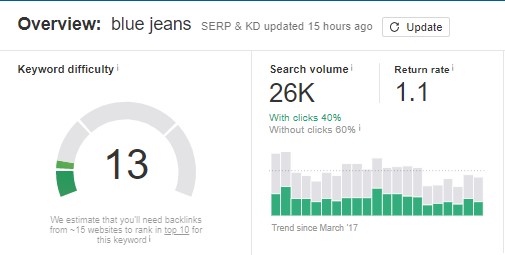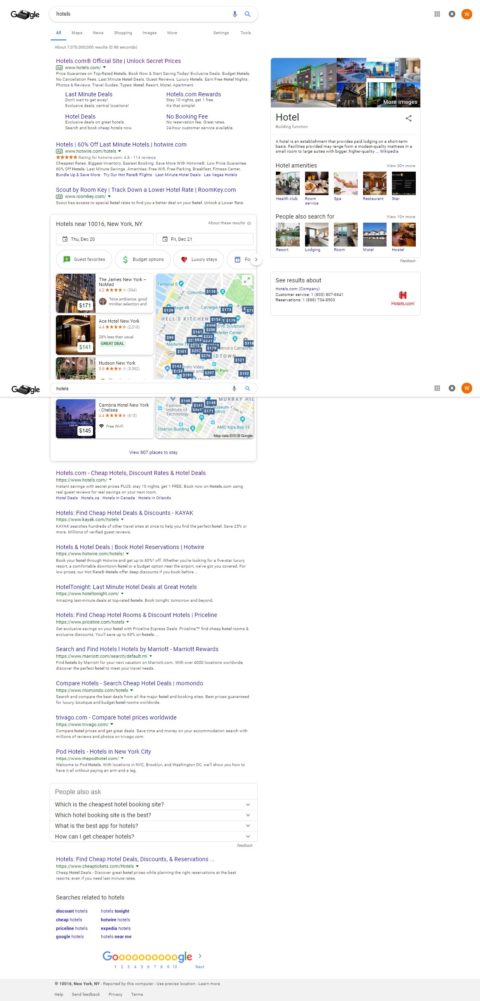Exact match domains (EMDs) were once incredibly valuable.
EMDs (domain names that precisely match a search query that will likely drive traffic to your website) tended to rank well.
When they ranked well, they drove tons of traffic.
If it was still 2012, it would be a no-brainer to buy an EMD.
But what about now? Do exact match domains still work?
Let’s explore.
What Did Google Do About EMDs?
In 2012, Matt Cutts, then Google’s chief spam fighter, announced an algorithm change that was aimed at reducing the amount of low-quality exact match domains in search results.
What did this mean?
A good example of a low-quality (or spammy) EMD might look like this: buybluejeansnow.com.
The owner likely registered this domain with the hope of easily ranking for the keyword “blue jeans”, which has an annual search volume of 26,000, or “blue denim jeans” which is searched about 400 times per year.

What’s the Problem with EMDs?
The problem with EMDs is the fact that they have been abused in the past.
A site that could be considered a EMD could be a spammy website if its URL exactly matches a search term and has little else to offer visitors.
Let’s go back to the example of buymybluejeans.com.
This site domain was registered this year, in July, and is only 158 days old.
Now some could argue that is a new domain but judging from the domain name and stats below, I believe it was a spammy EMD.
The site only has 7 backlinks which are coming from 2 referring domains, a DR of 0.2 and a UR rating of 4.

The site does rank for 4 keywords in the U.S., but these keywords are not that related to blue jeans and none of these keywords are driving organic traffic because they are not in the first page of Google and are virtually invisible in the SERPs.

Another issue with this site is that it does not have any unique content.
It’s basically a list of URLs taken from different sources with no imagery that links out to other sites.

Since the EMD update, Google has really cleaned up the search engine result pages and here is a great example.
A search for free online movies only has high-quality sites that are ranking for the search term.
Sites like Softonic.com, Cnet.com, and Popcornflix.com all have great domain authority and a decent number of links except for Softonic.com which has only 5 links pointing to that page that ranks but overall the root domain has tons of links.
| Site | DA | Links | Age |
| https://en.softonic.com/solutions/what-are-the-best-websites-to-watch-free-movies-online-without-ads | 90 | 5 | 13 Years |
| https://www.cnet.com/how-to/best-free-online-movie-streaming-services/ | 92 | 309 | 22 Years |
| https://www.popcornflix.com/pages/discover/d/movies | 68 | 120 | 14 Years |
With the advancements in machine learning and Google having so much end users’ data to show what is important and resonates with end users, and a rolling RankBrain algorithm, Google has gotten very good at understanding intent and giving users what they want to see in the search engine results pages (SERPs).
Sites that are deemed low quality have no place in Google’s SERPs today, although that does not stop spammers from trying spammy tactics to make their way to the top.
Does Google Like Exact-Match Domains?
In my opinion, Google likes exact match domains that are not spammy and a good example of this would be a domain like Hotels.com.
Hotels.com is a domain that is over 24 years old and is an exact match domain because the domain exactly matches the keyword hotels.
The domain hotels.com was purchased for about $11 million.
This domain name is a great signal of user intent for those searching for hotels.
A user would be able to find a hotel room and would go to this site to look for a room near their destination of travel just because it’s easy to remember, share, and type in.
The domain has more than 15 million links from 40,000+ sites, according to Ahrefs.
Now if the domain was for sale and if I had the money (which I don’t), I would surely buy it.

The site also has a domain authority of 89 because of its content, links, and age. This is a real authority domain.
Hotels.com also ranks in Position 1 for the keyword “hotels”, which is always catered toward your location; since Google localizes the results on both mobile and desktops.
The company also has the right strategy by making sure they are the first from a brand perspective with the paid search listings showing first and ranking in the 1st organic position in the SERPs.
Of course, they can’t rank for local listings because they don’t own the hotels and is only an OTA.

Google initially had used the EMD update to regulate spam and clean up the SERPs.
By the end of 2012, Google realized some valuable exact-match domain holders had been penalized simply for having a catchy EMD, but they issued an update to the algorithm that improved the value of these domains and punished the sites that were low-quality EMDs.
Should You Buy an EMD?
If you want an exact match domain, be prepared to do some extensive research.
Most of the good EMDs are already owned.
If you have some money in the bank, be prepared to shell out a lot of it to buy a domain that may be up for sale.
With many alternative domain extensions to buy (e.g., .business, .company), you might be tempted to grab those to protect your new investment or brand, but I just don’t see too many sites other than .com domains rank in the SERPs for competitive keywords.
Getting an exact match domain can satisfy user intent and help your brand because people know what your site should be about before they go to it.
Once they land on your site you should provide them with great content and good user experience, so they purchase your products or services.
Anchor text optimization is still important if it’s mixed. But if you get an exact match domain and get high-quality links from a lot of different referring domains, it will be natural because it is your brand and as long as you follow SEO best practices, you should not get penalized.
To find good EMDs, I recommend:
- Watching the news or search Google Trends.
- Going to a domain registrar.
- Using social listening to find the latest buzz words and go to see if the domain is registered. If it’s not, secure it, create some high-quality content, build links, get some social love, and make it a brand.
Putting the time, effort, and money behind your EMD can give you a competitive advantage of building a brand (not just a domain name) that will hold many memories that you can benefit from later.
More Resources:
Image Credits
All screenshots taken by author, December 2018
Subscribe to SEJ
Get our daily newsletter from SEJ’s Founder Loren Baker about the latest news in the industry!
